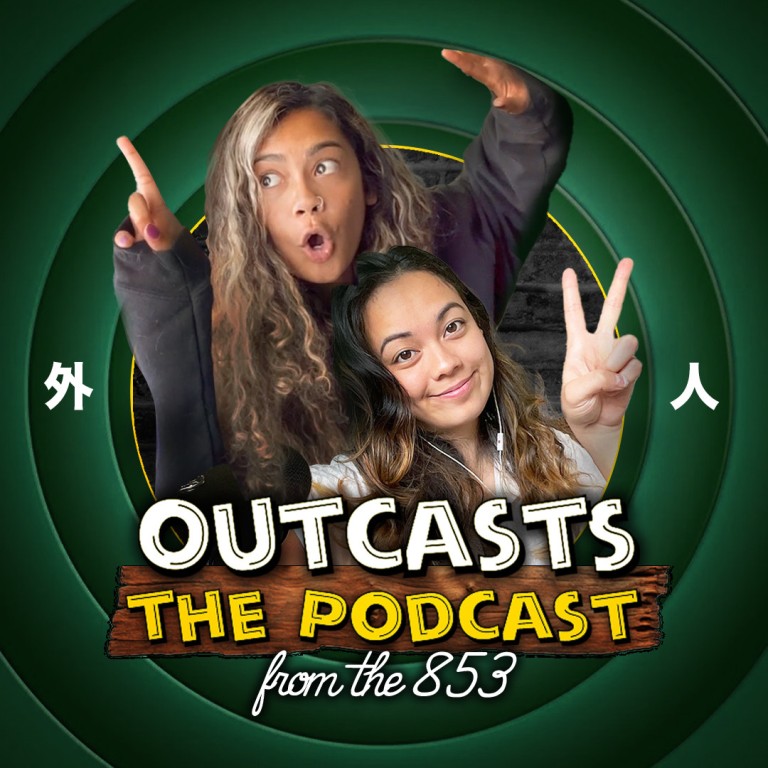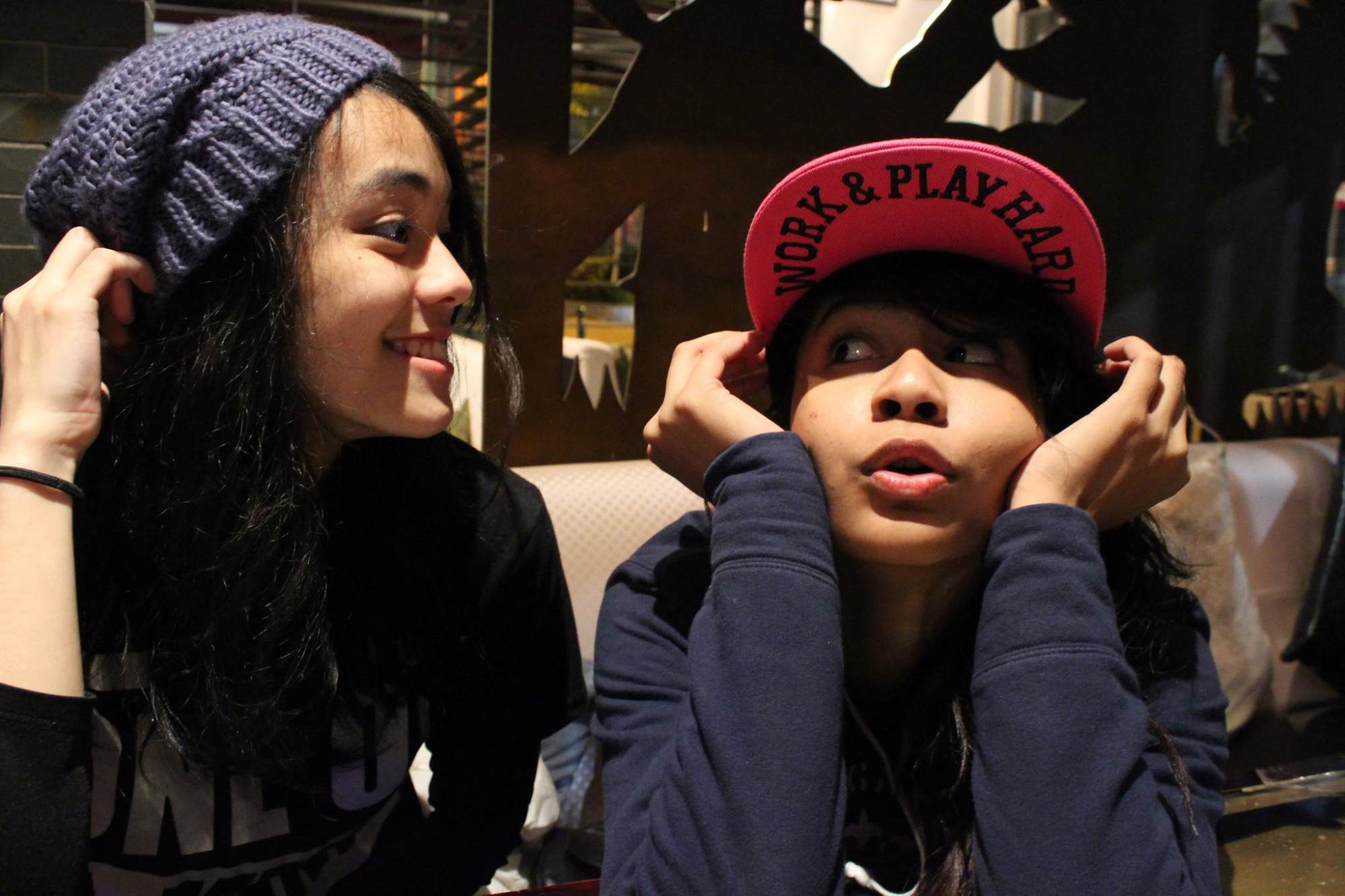
2 friends’ funny Cantonese language videos and podcasts on being ‘outcasts’ in the US are winning them fans across the world
- Fathima ‘Paji’ Mohamed and Iasmin Lumibao, who grew up in Macau, make funny Instagram skits focused on Cantonese and podcast about being third-culture kids
- They have over 45,000 Instagram followers but also a few haters, some of whom think they shouldn’t make Cantonese content because they’re not ethnically Chinese
If you have any connection to Cantonese culture, it’s likely that you will have seen Fathima “Paji” Mohamed and Iasmin Lumibao on your Instagram feed.
Under the moniker “Outcasts from the 853”, the two friends from Macau post short, funny skits on the social media platform and also host a podcast centred around Cantonese and growing up as third-culture kids.
Perhaps you’ve paused to watch their hilarious bad translations video – where Mohamed is seen ordering “dragon shrimp” (lobster) and “west broken flower” (broccoli) – or come across their meme featuring the four names for an ambulance in Cantonese, one of which is the childish-sounding “beeboo” truck.
Humour aside, their online content is also an exploration of their diverse cultural identities.
Mohamed, who is half Filipino and half Sri Lankan, and Lumibao, who is half Filipino and half Brazilian, have been friends since kindergarten.
They grew up in Macau, where they learned to speak Cantonese at school, but lost touch with each other after high school when they went to different universities – Mohamed studied at the University of Macau, Lumibao at the Macao Polytechnic University.
But they found their way back to each other in 2021 when both of them realised that they had separately moved to the US – Mohamed to Delray Beach, Florida and Lumibao to Westchester County, New York – after meeting and falling in love with their respective American partners.
‘Soft lum lum’? ‘Crispy bok bok’? Her dim sum Cantonese song went viral
After the two friends met up, they found themselves able to connect and relate to each other on a different level.
“We both felt really homesick after coming to America, and then we met up and it was like a gush of home,” Lumibao says.
“It felt like home because we were childhood friends, we talked about Macau, how much we missed the food – Portuguese egg tarts – and we didn’t have anyone that we could talk to about how much we missed [everything].”

That prompted them to have more conversations about growing up as third-culture kids and their experience moving to the US, and they came up with the idea of recording a podcast.
“It’s so hard to catch up with your family on FaceTime on your life because it’s the completely opposite time,” Mohamed says. “At least when we’re recording what we say, it’s almost like a journal for us.”
Plus, having made YouTube videos for fun since she was 12, Mohamed was already savvy with the technology.
“Within an hour or something, she came up with the logo, the page, everything,” Lumibao says. The green background in the logo, for one, is a reference to Macau’s flag.

The duo chose the name “Outcasts the Podcast”, owing to the fact they grew up as children of immigrants and as third-culture kids who now live in the US.
“We’re outcasts, because we don’t belong anywhere,” Lumibao says. “We felt like in Macau, we don’t belong, because we’re half Filipino, half [something else]. And here [in the US], we don’t belong; we feel like we’re out of home, like fish out of water.”


The pair launched their first podcast episode in November 2021, focusing on culture shocks they faced after moving to America. As they released more episodes and started promoting their podcast – including on the Facebook group Subtle Cantonese Traits – Mohamed and Lumibao found that their Cantonese content in particular resonated with listeners.
“It wasn’t our intention, but it was so nice to just find our niche. Because it took us a while to figure it out,” Lumibao says.
“We [actually] hated the fact that we only knew Cantonese instead of Mandarin in the beginning, because we didn’t know that there are Cantonese speakers in America,” Mohamed says.
“That wasn’t in my head. My mind was so small before I left for America – I admit that. Then we realised that’s the one thing that we have in common: Cantonese.”

The pair capitalised on this niche and began recording podcasts and creating funny skits on Instagram and TikTok centred on Cantonese.
Creating the skits came naturally for Mohamed, having always grown up as a mischievous class clown.
“I crave attention because at home I don’t get attention,” she says jokingly. “I’m also shy in some ways, in actual live settings. So at least with videos, I get to edit parts that I don’t want out, like when I stutter.”
It’s crazy [to] find out how so many people appreciate our content so much … We named ourselves outcasts, but it’s like we found our home
Some of the short videos that the duo have published include ways to tell someone to “shut up” in Cantonese, and how to use colours as adjectives. Podcast episodes, meanwhile, focus on topics such as growing up as immigrants, Cantonese idioms and proverbs, racism in America compared to other places, and mental health among Asians.
Over the past several months, Mohamed and Lumibao have seen their Instagram page skyrocket in popularity. They now have more than 45,000 followers on the platform, with fans from the US and the UK, as well as Norway, Sweden and the Caribbean Islands.
And while Lumibao used to contact other content creators for collaborations, plenty of people have now reached out to them to create videos together.

They have also launched their merchandise line, featuring sweatshirts that have been embroidered with dim sum images by Lumibao. They also sell a sweatshirt that says “Delay No More” – a phrase that bears a resemblance to a certain Cantonese profanity.
But though feedback on their content has been overwhelmingly positive, Mohamed and Lumibao have also received their fair share of haters and trolls. Some point to the fact that they are not ethnically Chinese – and thus shouldn’t be making Cantonese content – while others nitpick about what they say in their skits being factually inaccurate.
“We really try not to [let it] get to us, but I’m so sensitive,” Mohamed says, adding that everything they create is simply based on their own experiences. “We never claim that we are educators.
“I just want to say a disclaimer, I am an idiot,” she adds. “I am a fool, the clown for you to laugh at. So literally laugh, OK?”

They both hope to continue growing the account and keep connecting with fans near and far over Cantonese culture or on growing up as third-culture kids.
“It can also be a bridge for people in Macau, like our friends, to see different types of culture,” Lumibao says.
The pair have received messages from all sorts of fans, from second-generation Asian-Americans to parents who hope to teach their kids Cantonese.
“It’s crazy [to] find out how so many people appreciate our content so much,” Lumibao says. “This is who I’m in it for … We named ourselves outcasts, but it’s like we found our home.”

